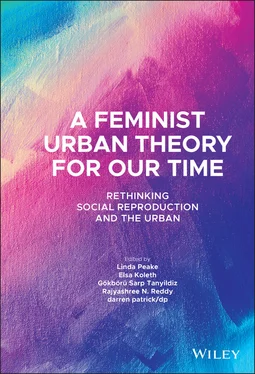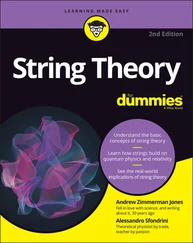1 ...7 8 9 11 12 13 ...18 Meera Karunananthan (Chapter 7) also focuses on struggles over the infrastructures of social reproduction, through an account of the feminist network Solidaritas Perempuan’s campaign for the right to water in Jakarta, Indonesia. Through an intersectional feminist approach, Karunananthan examines the ways in which human rights discourse might be employed to make visible urban poor women’s social reproductive struggle with privatized drinking water systems. Moreover, Karunananthan elaborates on how the right to water activism might help to recast the Trotskyite transitional programme in a feminist manner to recuperate subaltern women’s revolutionary subjectivity and expertise, which, she argues, is often unnoticed by the male leadership in established leftist groups. Karunananthan demonstrates that through the demands of collectivizing social reproduction in relation to urban water infrastructures, feminist activists of Solidaritas Perempuan Jakarta (SPJ) give priority to use-value production at the expense of exchange-value production, thereby reversing transnational capitalist logic and exposing its gendered violence at the urban, household, and bodily scales. For her, the sites of social reproduction and social reproductive labour are crucial in defeating capitalism in cities of the global South, and a social imaginary of a ‘just city’ becomes tenable with the reclamation of ‘the labour power of women whose unpaid work has served to subsidize’ postcolonial capitalism.
In Ruddick et al. (2018), we approached theories of the urban through a primary focus on social ontology, aiming not simply to situate the subject as an intellectual problem – ‘who acts’ – but to centralize processes of subjectivation. In this volume the authors track the empirical folding and unfolding of subject formation in ways that show the subject is not a mere artefact which can later be ‘situated’ within more or less determined processes of urbanization. As ‘the sedimented outcome of material social practice’ (Mitchell, Marston, and Katz 2004, p. 10), subjects are not only constituted relationally, but also by their physical environments which play a role in constituting intersubjective encounters. Beyond urban form, Hoffman’s (2014) research on how the politics of urban governance in Chinese cities leads to the normalization of the self as cosmopolitan – however incomplete – further evidences how subjectivities are shaped through urbanization, producing subjectivities that are not only in but also of the urban. She shows how urban politics is located in the constitution of new categories of subjects in Chinese cities giving rise to new modes of self-governance such as self-enterprise, volunteerism, and charitable giving. In the Chinese context, ‘This has produced particular kinds of cities (entrepreneurial, financially “efficient”) emerging in tandem with particular kinds of subjects (professionals and volunteers)’ (Hoffman 2014, p. 1583).
The formation of the self leads to a range of political possibilities – some collectively revolutionary, others highly individualistic. The contributors in this volume are not searching for a new or singular revolutionary subject, one which will indicate the exit, complete or otherwise, from any capitalist mode of production. Neither do they tend to an over-presence of the urban subject as a replacement for the industrial worker as the collective agent of revolution. As Mantha Katsikana describes in Chapter 4, the barriers to the construction of an anarchist and anti-authoritarian commons in Athens, many revolutionary movements continue to emphasize ‘the accumulation and display of male power’ as opposed to the ‘affective and connective labour practices’ needed for the ‘social and emotional change necessary to build and reproduce durable relationships’. Katsikana’s work speaks to the need to demasculinize radical and revolutionary subjectivities in order to better understand and appreciate how the ‘emotional needs and manual tasks necessary for the everyday context of collective actions’ are undertaken primarily by women in these movements (as well as the broader context in which many contemporary transformative movements are led by queer women and women of colour). Her work points to the collective renegotiations necessary to enable the malleability of subjectivity as a relational form of collective self-understanding. Katsikana’s study is a welcome antidote to the now well-travelled theories of revolutionary urbanization and revolutionary subjectivity within urban studies that have overlooked the role of social reproduction and the fabric and texture of everyday life in promulgating transformations. Seeing greater potential for an engagement with gendered subjectivities in the shift from the factory as the heart of revolutionary struggle, feminist scholars have argued that struggles are not just about belonging in the city but also about how the city belongs to those whose invisibilized and unpaid labour maintains the urban (Buckley and Strauss 2016). We also see this engagement in Karunananthan’s work with SPJ, which ‘calls for Marxist debates regarding revolutionary praxis to be re-examined in light of both the constraints faced by women living in the margins of cities of the global South as well as their aspirations.’
What is evident from the research reported in these chapters is that for increasing numbers of people their own social reproduction is increasingly precarious and provisional, falling outside of and challenging the norms of a neo-liberal political subjectivity. Precarity, generally, speaks to the disintegration of stable societal bonds, social protections, and senses of entitlement and belonging, creating lives structured by insecurity, eroding the possibility of life itself (Puar 2012). Precarity is not born of the economic project of neoliberalism, but is a signifying characteristic of it. With increasing inequality, the reorganization of economic and social relations in the context of the hollowing out of social and political institutions, and in the absence of infrastructures (Butler 2012), we can think of the governance of precarity as designating not only working and living conditions but also subjectivities and embodiment, and therefore agency. And as such, as Lauren Berlant (2011) notes, precarity is also a structure of affect internally inculcated into subjectivity via anxiety as the dominant lived experience of insecurity. From the point of view of organizing the everyday, the increasing inability to replenish the self, materially and mentally, has had enormously deleterious effects. Decades of neoliberal scouring out of the social and the permeation of the values and organizing principles of finance capital into society more broadly are leading to new forms of subjectivation, with a depleted, indebted, and anxious subject now prevailing across a wide variety of places.
It is within this context that Simone’s notion of ‘people as infrastructure’ and Caroline Moser’s notion of women’s triple role – of reproductive, productive, and community-managing activities – come together to highlight how a strongly gendered division of labour not only in the household but also within communities, underlies, ‘economic collaboration among residents seemingly marginalized from and immiserated by urban life’ (Simone 2004, p. 407). Belinda Dodson and Liam Riley ( Chapter 10) illustrate this convergence with reference to food systems in three African cities: Kitwe in Zambia, Kisumu in Kenya, and Epworth in Zimbabwe. Within households in these cities women are largely responsible for food procurement, allocation, and preparation, and in the broader urban food economy they are ‘important actors … as traders, processors and producers, especially in the urban informal sector.’ It is their paid and unpaid time engaged in food-related labour that helps reproduce patriarchal family structures and limits women’s participation in other activities, placing strictures on their subjectivity formation. This particular ‘mode of provisioning and articulation’ speaks not necessarily to an ‘efficient deployment’ of the ‘energies of individuals’ (Simone 2004, p. 407) but to ‘the gendered social forms and practices that reproduce life, family and labour in conditions of urban precarity’ (Dodson and Riley).
Читать дальше

![Михаил Лермонтов - A Hero of Our Time [New Translation]](/books/27671/mihail-lermontov-a-hero-of-our-time-new-translati-thumb.webp)










